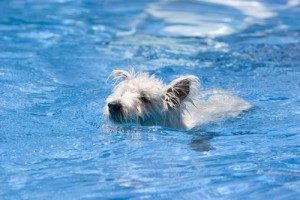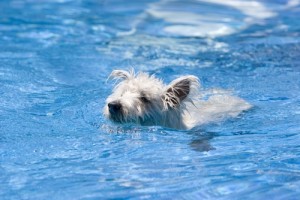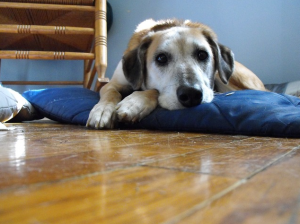
Beating the heat can be a challenge but a few simple tips and tricks can help make it safer for you and your pet when temperatures rise.
- Plan a visit. Visiting the vet in early spring can help you prepare for those pesky summer pests. Ensure your dog is properly vaccinated and up-to-date.
- Never leave your dog in a parked car. Cracking the windows won’t cut it. Leaving your pet alone for any length of time in high temperature seasons put your pet at risk from dehydration and heat stroke. Even when it’s eighty degrees outside, inside your vehicle it’s ten, twenty, even thirty degrees hotter.
- Stay in the shade. Beaches, parks, parades. Summer is full of family friendly activities that enable you to spend time outdoors with your pet. But too much of a good thing can be bad for your pet. Dogs and cats dehydrate quickly so give them lots of water and plenty of shade. Hot asphalt can burn sensitive paw pads so find grass instead of lingering on roadways.
- Limit exposure. Pets sunburn the same way people do, especially if your pet has short or white hair. Limit your pets time in direct sunlight and provide them with plenty of shade if outdoors for an extended period of time.
- Know the signs. If you’re pet is overheated, several symptoms made be exhibited to clue you in that there’s a problem. Excessive panting or drooling, increased pulse, mild weakness, and seizures are all results of heatstroke. Should your pet overheat, immediately run cool (but not ice cold) water over your pet and wrap them in cool blankets. Then seek immediate help from your veterinarian.
- Food and fun. It might seem silly but as barbecue season approaches, you should remember that not everyone has a pet and knows the rules. Pets should be given alcohol or any snacks, as the food and drinks you serve your guests can be potentially fatal for your pets.
- Water works. It’s a fact: not all dogs can swim. Don’t let your pet wander into the pool unless they’ve been conditioned to the water and can stay afloat with ease. Watch your pets around the pool and never leave them unsupervised. Always rinse your dog off after swimming to remove chlorine or salt from his fur, and try to keep your dog from drinking pool water–chlorine and other chemicals that can upset your pets’ stomachs. And if boating, make sure your pets wear their own flotation device!




